CUC eNews: June 11, 2020 – Issue 115
In This Issue:
- Letter From Vyda
- UU Perspectives On Anti-Black Racism
- Black Lives Matter Resources for Education and Reflection
- Missing and Murdered Indigenous Women and Girls
- Pride Month: Calgary Unitarians Rainbow Banner a Piece of Canadian History
- Celebrating With Joy
- Rev. Dr. Steven Epperson Retires From UU Ministry
- Understanding Canadian Copyright Law and Congregational Music
- Canadian UU Summer Services Series
- Unitarians From A to Z
- Upcoming Events
Letter From Vyda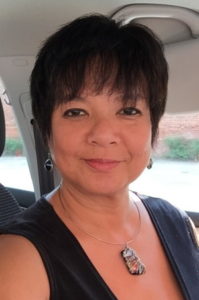
The CUC issued a statement on Saturday, May 30 in response to the rising tensions in the US about the death of George Floyd, and increasing the global call for racial justice. While it was quite obvious what the statement should say, finding the right words to convey the depth of our grief and anger and also our compassion for those affected was challenging.
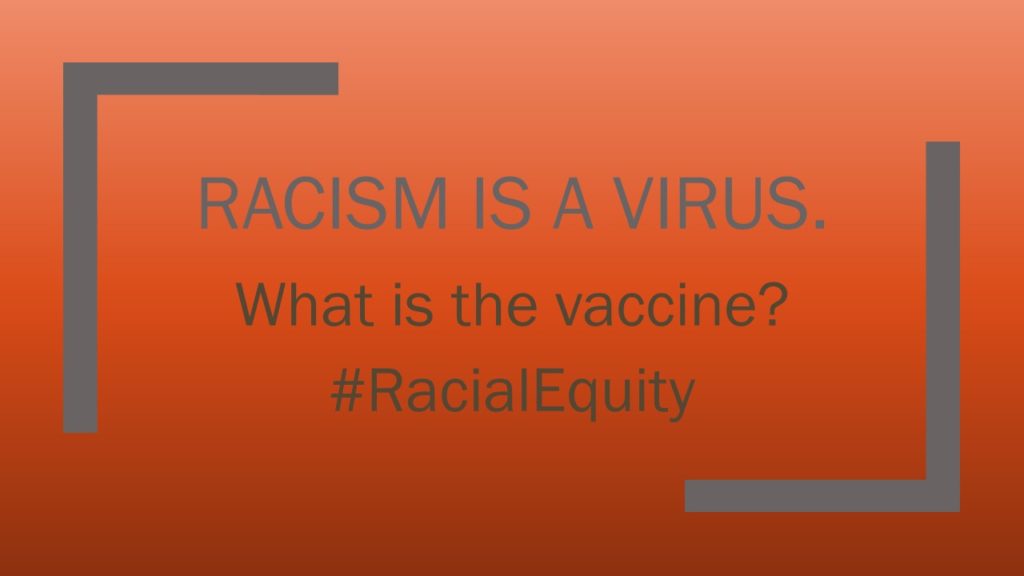
Since that statement was issued, events have evolved rapidly, with mass rallies and demonstrations, and with people showing up to support #BlackLivesMatter in a variety of ways. Racism knows no boundaries – it infects every level and strata of society. We clearly acknowledge that racism is a systemic issue that impacts us here in Canada and around the world. We all have work to do.
Issuing our statement is just one of the steps in the conversation and the work. At a national level, the Dismantling Racism Study Group has been gathering the stories of how Canadian UUs experience racism, and are working on determining what some of our next steps will be. We are also working to dismantle racism through our Truth, Healing and Reconciliation initiative, and our refugee sponsorship efforts. And we continue to have conversations about how we can support UUs and congregations as they process the news and commit to working personally and within their communities to confront and dismantle racism. We are listening to the feedback from our congregations and UUs as they challenge us to do more.
As part of our efforts towards equity and dismantling oppressions, I invite you to a roundtable conversation on “Black Lives Matter: A Canadian UU Perspective” on June 25 at 7 pm ET . Many have expressed a desire to be in conversation, and to understand how we can respond as Canadians and as UUs. Please join us in this important discussion.
In future editions of the eNews, we also will bring you stories of UUs who navigate discrimination based on their race, sexual orientation or gender identity, economic status, physical abilities, intellectual and developmental disabilities, and other differences. Because one of the first things we must do to confront racism and discrimination is to listen so we can understand when it happens, what it looks like and how it feels, and to be in relationship with those affected so that we may act.
Given the increasing calls for racial and social justice, I believe many of us recognize that we can do more – individually, at local and congregational levels, and organizationally. We need a multi-layered approach. We each own a piece of this problem and we each need to be asking ourselves questions about what we can do better, how we can become more educated, more aware, and more supportive as we do this work collectively and individually.
We are committed to continuing with this conversation and with the work at the national level, both with staff and with leadership teams. We don’t have all the answers. We are aware that we need to listen as much as we need to act, and we are committed to doing both.
Please keep safe, my friends, as you ponder how to manifest advocacy, solidarity and equity during this pandemic.
In peace,
Vyda Ng
For more information about how UUs across the country are responding see the statements from Unicamp and Canadian Unitarians for Social Justice.
UU Perspectives On Anti-Black Racism
The CUC asked three Canadian UUs to share reflections on the death of George Floyd and the resulting protests and calls for racial justice in the US and around the world. These are their responses.
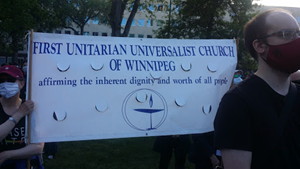
BLM Protest Winnipeg, Photo by Joan Carolyn
Beverly Horton, Co-Chair of the CUC Dismantling Racism Study Group
Over the past several days, white friends, particularly friends from my UU community, have called or messaged me to find out how I am doing. More than once, their expression of concern has been some variation on “I have no words.” I understand that. I’m struggling with words too, struggling to find words. In this moment, the horror of racial violence is much more readily lodged and living in my body than in language. Not finding the words is of significant consequence for me in a moment when, as a black woman, one of a painfully few Canadian Unitarian People of Colour, I am being asked for words. I’ve got skin in the game, (pardon the pun), so I am expected to have words.
“Know Justice. Know Peace.” That’s what I can find for now, and I’m punting this to my fellow Canadian Unitarians as my contribution to our collective efforts to confront white supremacy and dismantle racism. (I wish I could claim credit for the clever play on ”No Justice. No Peace,” words we’ve heard chanted and seen written on many signs over the past few days of public protest, but I can’t).
As it relates to racial injustice, the free and responsible search for truth and meaning that we are called to live, to live urgently in this moment of peril and possibility, requires that we understand what white supremacy is and how it shapes our personal and institutional engagement with policy and protocol in the public realm. So “Know Justice. Know Peace.”
Liz James, member Saskatoon Unitarians
I used to talk proudly about how much less racist Canada is than the US. I greatly regret that, now.
Canada’s racism is definitely subtler—but Canada is a culturally subtler nation. But many of the key indicators—infant mortality, poverty, incarceration—paint pictures of a country that’s actually slightly worse.
More importantly, it doesn’t matter. The question isn’t whether we’re racist relative to the US. The question is whether we’re racist relative to the amount of racist we want to be.
I mention this now not to discourage protests over the death of George Floyd—it is never wrong to be outraged over injustice, no matter where it happens. I mention it because at times I have attended similar protests and used language implying it was an American problem and done damage at home even as I was talking about the mote in my neighbour’s eye.
If I could speak to Liz from then, as she went on and on about how that couldn’t happen here (this was pre-Colten Boushie, but post starlight tours—google “Saskatoon starlight tours” if you don’t know) I wouldn’t shame her. I get that racism is sometimes cruelty perpetuated by someone intentionally, but far more often it’s just regular, kind, people doing what they were taught. We didn’t create the frameworks we inherit. They are not our fault. But they are our inheritance, and we are responsible for what we do with them.
If I were talking to ten-years-ago me, I’d just say “Are you sure about what you’re saying? Do you think you’re the one best equipped to judge this? Have you thought about the impact your words might have on people of a diversity of races?”
And then I’d encourage yesterday-me to funnel all her rage and pain about events in another country into working on the very real problems here… Because I am a person of limited energy, and I want to spend my energy where I can have the most impact. And because I cannot imagine how much it would hurt to be someone watching their neighbours ignore their pain while raging on about racism far away.
Today-me wasn’t there to say any of this to yesterday-me—so others said it. For which I’m grateful. And ten-years-from-now me will have things to say about this post, I’m sure.
I hope, anyway. Because I want to keep growing. And because the question isn’t how racist I am relative to yesterday me. The question is how racist I am relative to how racist I want to be.
Rev. Fulgence Ndagijimana, Affiliated Community Minister, Saskatoon Unitarians
Written on Sat, May 30
My dear friends and colleagues,
It has been quite a few days. For people of colour and especially black people, it has been generations upon generations and centuries of abuse and mistreatment.
The murder of George Floyd is horrible and this is an understatement. But for black people who live in countries where white-supremacy reigns supreme, that murder is a trigger for what we have to go through on a daily basis in the form of arrogance, ignorance, belittlement, microaggressions,…and ultimately death!
I watched the video of the murder of George Floyd with my 12-year-old son. None of us could finish the video. We had to turn away and we both cried. We were both angry, scared and confused. My son then asked me, the next time it happens in Saskatoon, will you go to protest? I said yes of course. Then he asked, what if you get murdered? Imagine a 12-year-old having a conversation with his dad about a possibility of being murdered for being black!
In the past year, I had to contend with a neighbour calling the city because our car was parked on the street and will “never know why”. We had a landlady say that because African food makes her house dirty, she would keep our rent deposit. And sadly, I experienced people from my own faith movement refusing to believe that I am a Unitarian Minister as I attempted to enter a meeting venue because I am black!
I came to Canada escaping persecution and murder and seeking refuge. I am grateful for the protection that Canada has given me and the support of UUs. But even here, I need to breathe better. Many black people I talk to do not know what to do about the racism they experience and so they suffer in isolation, fear and anger.
Tomorrow is Sunday, In circumstances like these ministers wonder what to say. There is no beating around the bush, we all feel rage when our sense of justice is offended. There is no peace without justice.
In anger and rage, go out and disrupt the white-supremacy system.
The CUC’s statement on the death of George Floyd is available on our website.
The CUC also supports the call by family members of George Floyd, Breonna Taylor, and Michael Brown, among others, to the U.N. Human Rights Council to convene a Special Session on the grave human rights crisis born out of the repression of nationwide protests in response to the police killing of George Floyd.
The letter urges members of the U.N. Human Rights Council to mandate an independent inquiry into:
-
- the recent history of racist policing in cities across the country that continues with seeming impunity from the killing of Michael Brown and the repression of protests in Ferguson, Missouri, to the murder of George Floyd.
- allegations of excessive use of force against peaceful protesters and journalists in the demonstrations in U.S. cities since the murder of George Floyd.
Black Lives Matter Resources for Education and Reflection
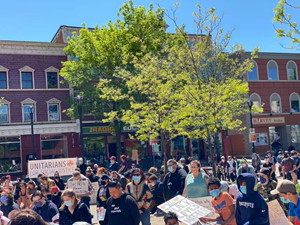
BLM Protest Fredericton, photo by Emmanuel Brown
These resources are some that our UU friends and colleagues recommend to better understand the current protests and the Black Lives Matter movement in Canada and around the world.
Books:
Desmond Cole’s, The Skin We’re In: A Year of Black Resistance and Power, 2020 Doubleday Canada
Robin DiAngelo, White Fragility: Why It’s So Hard for White People to Talk About Racism, 2018 Beacon Press
Ta-Nehisi Coates, Between the World and Me, 2015 Spiegel & Grau
Ijeoma Oluo, So You Want to Talk About Race, 2018 Seal Press
Articles:
The Guardian: “Not About the Needs and Feelings of White People”
The Globe and Mail: “Racial Disparities in Toronto Police Force”
Other resources:
CBC: Facing Race
CBC: Out in the Open interview with Ibram X Kendi
CBC: Curio: “Report on Racial Profiling by Toronto Police”
Five Ways to Support Black Lives Matter, from our UU colleagues in the US
Missing and Murdered Indigenous Women and Girls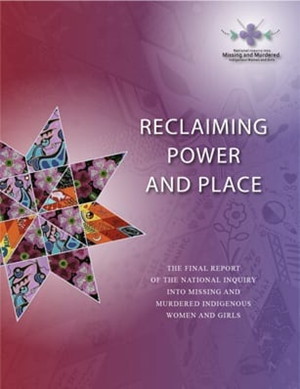
June 3, 2020, marked one year since the National Inquiry released its report on Missing and Murdered Indigenous Women and Girls. The $92 million federally-funded inquiry compiled the stories of more than 2,380 family members, survivors of violence, experts, and Knowledge Keepers. It delivered 231 recommendations directed at police forces, institutions, social service providers, and all levels of government.
A follow-up report was due to be issued this June but has been put on hold as a result of the Covid-19 Coronavirus.
The Native Women’s Association of Canada (NWAC) issued its own report to hold the government accountable for a lack of action on implementing the Inquiry’s recommendations.
While the CUC recognizes that Covid-19 has placed huge challenges in our way, we call on the government to fulfill their commitment for a plan of action on the MMIW recommendations. This needs to be a priority, as women face a surge of violence during this lockdown period.
For more information:
The Native Women’s Association has issued a report called Government Follow-up to Reclaiming Power and Place. Read the Inquiry’s full report.
Read More about CUC Initiatives Related to Indigenous Issues
Pride month: Calgary Unitarians Rainbow Banner a Piece of Canadian History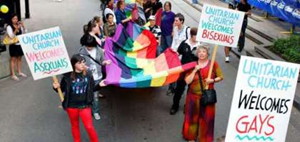
June is Pride Month, and for five youth who grew up in the Calgary Unitarians congregation, it’s sure to hold a special significance. The group set out in 2003 with the goal of creating a giant rainbow banner in support of equal marriage rights. They never imagined that they would eventually create one 500-feet long banner which they would display on Parliament Hill in June 2005, just a month before the vote that made equal marriage the law in Canada. Various sections of the banner have appeared at same sex-weddings and in Pride parades, and a part of it is now displayed at the Canadian Museum of History. In this piece, Christine Mishra, one of the five, reflects on the banner’s unlikely journey and its lasting significance.
Learn More About UU Welcoming Congregations
Celebrating with Joy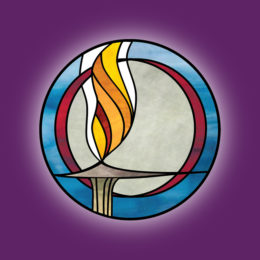
Long time UU Volunteer with the Lay Chaplaincy Committee, Joy Silver, is stepping down after an incredible two decades of service to the lay chaplaincy program.
In a note, Joy shared, “In the past 20 years I have had the honour of serving on the Program team and been witness to the deepening, maturing development of the Program courageously moving from novice steps to masterful oversight. I wish to thank the many CUC administrators, UU ministers, lay chaplains and congregational leaders for whom I have felt the call to “come, come whoever you are”.
Joy served as Chair of Canadian Unitarian Universalist Lay Chaplaincy Association (CUULCA) for several years, presiding at gatherings of Lay Chaplains at National Conferences and has continued to be involved in leadership roles on what was once the CUC Lay Chaplaincy Program Steering Committee – West and most recently, on the National CUC Lay Chaplaincy Committee. Joy helped to revise the Congregational Lay Chaplaincy Programme manual in 2010, and has served as an exemplary contributor to the program and a superb mentor for countless lay chaplains following in her footsteps.
“On behalf of the Committee, I express our deepest gratitude for her many years of service to lay chaplaincy, our Committee, her congregation, and her community, and wish her good health and the very best of everything in her future endeavours”.
– Ellen Newman, Chair, National CUC Lay Chaplaincy Committee
Rev. Dr. Steven Epperson Retires from UU Ministry
After nearly 20 years as an ordained UU minister, 18 of those serving Vancouver Unitarians, Rev. Dr. Steven Epperson will retire this June. The beloved minister came to Unitarianism via a unique path and an encounter with the first modern Unitarian martyr.
A former professor of religious studies at Brigham Young University, Steven realized that he and his family could no longer remain in their Mormon faith for a variety of reasons, both personal and professional. Interestingly, his first research paper in a religious studies course introduced him to Michael Servetus, a radical 17th-century thinker, and he found some of the foundational ideas of Unitarianism to be compelling.
In 1996, Steven began attending Unitarian services at his local congregation and soon realized he’d found a place he could call home. After attending services for two years the minister of that congregation asked if he’d ever considered Unitarian ministry as a career for himself. That question shifted his personal and spiritual path, and Steven was ordained in 2001.
“It’s deeply rewarding work for me personally,” he says. “I feel like I’ve grown a lot by being able to serve, study and write sermons, and act on a number of social justice issues. It’s been amazing work; it’s the best kind of work I could possibly do.”
Steven believes strongly in intergenerational ministry and has found connecting with and making connections between congregants of all ages to be one of the most rewarding aspects of ministry for him. His bio on the Vancouver Unitarians page says he knows how to darn socks, clean a bathroom, read good stories out loud at bedtime, and shingle a roof. He’s a man of many talents and interests, and has been grateful that his role in ministry calls on all his skills and experience.
Like all his colleagues, the physical distancing required by the COVID-19 pandemic has impacted Steven’s ministry. He feels fortunate, however, to have been able to work with a dedicated team of technologically-savvy young congregants to address the challenges this poses, and ensure that members of the congregation remain able to serve, worship, and connect.
Steven believes Unitarianism will remain relevant by staying true to its vision. He appreciates the fact the faith has a long tradition to draw upon but also a willingness to be adaptive, something he sees as both a challenge and a strength.
A devoted father, grandfather, and husband, Steven finds his family life deeply rewarding. He looks forward to the opportunity to spend more time with his family upon his retirement later this year.
Understanding Canadian Copyright Law and Congregational Music
With the physical distancing requirements prompted by the Covid-19 pandemic, congregations are live streaming or recording their services and the accompanying music. The Canada Copyright Act allows religious organizations and institutions to perform music in public and to play sound recordings or broadcasts of music in public as part of furthering a religious, educational, or charitable goal without compensating the copyright owner. The religious exemption to the Act also allows, among other things, “the performance in public of a communication signal” carrying a live public performance or sound recording of music. So no permission or payment is needed to post online music that is legitimately included in the service.
It is important, however, to understand where the limitations of this religious exemption lie.
-
- It does not cover anything except music. If you want to read a copyrighted story or poem, or show a clip from a copyrighted film, you must obtain the permission of the copyright holder. (There may be more than one! Copyrights on different elements of a single work can be held by different owners.)
- It does not allow copying. You can sing a copyrighted song in your service, but if you want to make copies of the music or lyrics—including printing them in the order of service or giving copies to chorus members to rehearse or perform with—you must obtain the permission of the copyright holder.
- It does not cover any purposes except religious, educational, and charitable ones. If you want to use copyrighted music in, for example, a fundraising concert, a coffee house, or an open mic evening, you must obtain the permission of the copyright holder.
Many of the hymns in the Singing the Living Tradition and Singing the Journey are copyrighted by the UUA or are in the public domain. The UUA is very generous in granting permission to use UUA-copyrighted hymns, including permission to make nondurable copies for use in worship (such as by projecting lyrics). However, the songs we love to sing come from many sources. The UUA does not hold the copyright for all the songs in our hymnals, and the copyright to the music, lyrics, arrangement, and harmony of a single song can all be held by different owners. Be mindful of who owns the songs you wish to share, and be aware of the boundaries of the religious exemption.
Contact the CUC For a List of UUA-Copyrighted Hymns
Canadian UU Summer Services Series
This summer of 2020, in celebration of Canadian UU resiliency and to connect us across the country, nine congregations are hosting Sunday services. Between July 5 – August 30, these congregations will share their service, and provide a summer service travelling experience across Canada. The idea was inspired by Rev. Keith Kron, Transitions Director at the Unitarian Universalist Association, as a way for people to continue connecting, visit with other Canadian UUs, experience different worship styles, and share the workload of providing regular services.
For these country-wide Sunday services, the CUC has chosen to work with start times of 1 pm PT | 2 pm MT | 3 pm CT | 4 pm ET | 5 pm AT, so that this will not interfere with other services still being offered.
Join us online on the following Sundays at https://bit.ly/UUSummer – pre-registration on Zoom required. The CUC’s Zoom has a capacity of 1,000, so if you find yourself unable to enter the service, even if you’re pre-registered, head on over to the CUC’s YouTube channel.
July 5: North Shore Unitarian Congregation
July 12: Unitarian Church of Edmonton (NOTE that this service start time is at 10:30 am MT)
July 19: Youth-led
July 26: Unitarian Church of Montreal
August 2: Young Adult-led
August 9: Unitarian Fellowship of Fredericton
August 16: Saskatoon Unitarians
August 23: Grand River Unitarian (Kitchener ON)
August 30: Westwood Unitarian
Unitarians From A – Z
Join John Sproule from Don Heights Congregation for a light-hearted PowerPoint show on Unitarian, Universalist and UU biographies, with audience participation. Each show stands on its own.
First edition: Every 2nd Tuesday, covering S onwards – June 9, July 14, August 11
Second edition: Every 4th Tuesday, finishing C and proceeding with DEF – June 23, July 28, August 25
7:00 PM EDT, on the usual Don Heights Zoom channel
Topic: UU A to Z: S part 1, Time: Jun 9, 2020, 07:00 PM ET
Join Zoom Meeting: https://us02web.zoom.us/j/8339952710?pwd=R0k0ZXI3WllFR2xFMW9UWEdjTDlOZz09
Meeting ID: 833 995 2710
Password: 1111
Visit & Like the Canadian Unitarian Council on Facebook!
Upcoming Events – Until further notice, all CUC events will be held online via Zoom.
Share what’s going on in your congregation. Contact communications@cuc.ca
COVID Leaders Sessions
Saturday, June 20 – Supporting congregations over the summer
9 am PT | 10 am MT | 11 am CT | 12 pm ET | 1 pm AT
Processing the Pandemic: Young Adult Grief Ritual
Thursday, June 18, 5:00 pm PT | 6:00 pm MT | 7:00 pm CT | 8:00 pm ET | 9:00 pm AT (1.25 hours)
Black Lives Matter: A Canadian UU Perspective Roundtable
Thursday, June 25, 4 pm PT | 5 pm MT | 6 pm CT | 7 pm ET | 8 pm AT
Join a panel of Canadian UUs, facilitated by CUC staff, for an enlightening discussion about systemic racism in Canada. Together we will consider how we can respond individually and as a community of faith, and what we can do to actively oppose and dismantle racism in ourselves, our organization and in our broader community.
Fostering Healthy Congregations, Saturday, July 18, 9 am PT | 10 am MT | 11 am CT | 12 pm ET | 1 pm AT ( 6.5 hours with breaks), registration deadline: July 11
Healthy relationships are crucial to building a strong and inclusive congregation. How can we respond appropriately and sensitively to conflicting priorities and perspectives within our congregations? Leaders, board members, ministerial staff, and committee chairs are invited to explore aspects of congregational connection and conflict. Cost: Sliding scale – $10 – $40, Groups (3 or more) – $20 per person (one person must register the whole group at one time).
Regular Online Events
Gathered Here: Young Adult Check-In
June 22 – 2 pm, July 6 – 8 pm, July 23 – 2 pm, (all times ET)
Connect and Deepen – Virtual Gathering
Sunday, June 14, Saturday, July 11, 1 pm PT |2 pm MT| 3 pm CT| 4 pm ET| 5 pm ADT
Please register in advance.
Canadian UU Summer Services Series – 1 pm PT | 2 pm CST & MT | 2 pm CDT | 4 pm ET | 5 pm AT
Join us online on the following Sundays at https://bit.ly/UUSummer or the CUC’s YouTube channel.
Join Canadians from across the country as we gather together for a national Sunday service each week.
July 5: North Shore Unitarian Congregation
July 12: Unitarian Church of Edmonton (NOTE that this service start time is at 10:30 am MT)
July 19: Youth-led
July 26: Unitarian Church of Montreal
Fostering Healthy Congregations, Saturday, July 18, 9 am PT | 10 am MT | 11 am CT | 12 pm ET | 1 pm AT ( 6.5 hours with breaks), registration deadline: July 11
Healthy relationships are crucial to building a strong and inclusive congregation. How can we respond appropriately and sensitively to conflicting priorities and perspectives within our congregations? Leaders, board members, ministerial staff, and committee chairs are invited to explore aspects of congregational connection and conflict. Cost: Sliding scale – $10 – $40, Groups (3 or more) – $20 per person (one person must register the whole group at one time).
International Events
Unitarian Universalist Association General Assembly, June 24 – 28, 2020,
The UUA General Assembly is a 100% virtual event this year – a great opportunity to attend. Online registration is $150 USD. The CUC will be presenting a live online workshop on Truth, Healing and Reconciliation, with guest Sharon Jinkerson Brass, on Sunday, June 28.
